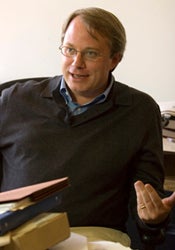In a Jun. 8 review in The New Republic, Harvard Law School Professor Adrian Vermeule ’93 discusses a new book by Jack M. Balkin, titled “Constitutional Redemption: Political Faith in an Unjust World” (Harvard University Press, 2011).
On Balkin’s view of Constitutional interpretation, Vermeule writes: “[Balkin argues] that the practice of interpreting the Constitution, and pursuing justice through the processes of constitutional politics, presupposes that the interpreter has fidelity to the Constitution’s project, and has faith that the course of constitutionalism will eventually lead to the Promised Land.”
Vermeule, who is the John H. Watson, Jr. Professor of Law at HLS, most recently wrote “The Executive Unbound: After the Madisonian Republic” with Eric A. Posner. He is an expert on Constitutional Law and Theory.
Ideals and Idols
By Adrian Vermeule
The cover of Jack Balkin’s new book perfectly captures its temper, and that of many progressive constitutional theorists. Dark clouds swirl over the land, while in the distance, beyond the mountains, a narrow band of sunlight gleams. But is it the rising sun or the setting sun? We must have faith, Balkin argues, that the promises of the Constitution will someday be redeemed, and a new dawn of justice will blaze forth.
Balkin is a prolific constitutional scholar at Yale Law School, and one of the principal figures in a recent movement that advocates a progressive approach to constitutional interpretation called “framework originalism”—the notion that the original meaning of the Constitution, understood at a sufficiently abstract level of generality, supports the ongoing project and aims of left-liberal constitutionalism. Although a chapter here describes Balkin’s version of originalism, he has another book forthcoming on that subject, and the main thrust of this book is different. The basic argument, repeated frequently, is that the legitimacy of the Constitution presupposes and requires that its interpreters—not only officials and legal theorists, but the citizenry at large—must have faith that the Constitution’s promises of justice can eventually be redeemed. And this leap of faith is inevitably a gamble, because the future course of constitutional law and politics is always uncertain, and no one can know how the future will judge the present. … read the full review on TNR.com
